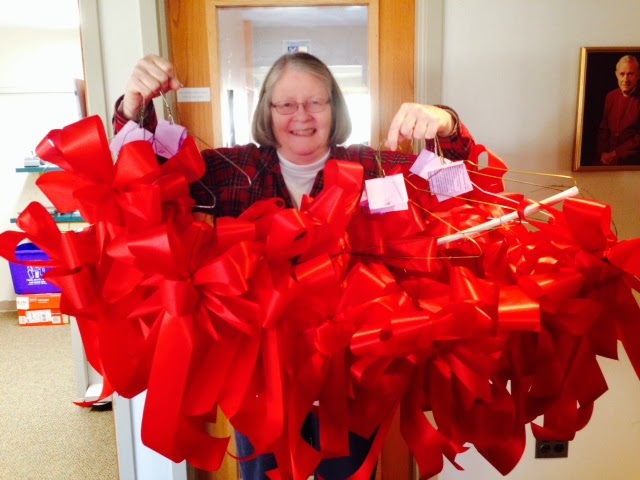May 17, 2015
Cathedral Church of St. Paul
Burlington, Vermont
The Very Rev. Jeanne Finan
When love comes to town
He started out his life as Riley B. King.
Born into a family of sharecroppers
in a little town outside of Itta Bena, Mississippi.
His first work as a young boy was driving a tractor in the cotton fields.
But what he really loved was music.
He loved playing music.
He loved singing.
Soon he was known—not as Riley—but as Blues Boy King.
Later—just B.B. King.
B.B. King died on Thursday. He was 89 years old.
Death, even a good death, leaves an empty space inside of us.
When we lived in Memphis
Tom and I got to hear B.B. King play
at a club down on Beale Street.
We were sitting at a table so close to the stage
I could have reached out and touched
his Gibson guitar, the one he called Lucille.
He used to say,
“Oh, Lucille, you are the best woman I have ever known.”
B.B. King would probably be the first to have admitted
that he was no saint.
You can listen to some of his songs and easily imagine that.
Let the good times roll…
But as he aged,
he had one of those faces and demeanors
that, to me, remind me of people
who have known the bottom
but never gave up hope that there was a top.
People who have known suffering,
people who have made mistakes,
people who have known what it is
to be persecuted and judged so wrongly.
People like this—
they either become harsh and bitter—
or they completely surrender to God’s love.
B.B. King was a man
who knew the bottom,
but found the way beyond.
Through music.
When love comes to town I’m going to jump that train
When love comes to town I’m going to catch that flame
Maybe I was wrong to ever let you down
But I did what I did before love came to town.
Jesus is the love that came to town.
Jesus knows this.
At least he knows it and claims it in John’s gospel.
In the gospel we hear this morning,
Jesus is praying.
Jesus seems to always take time to pray.
I laugh at myself sometimes when I miss
my prayer time and make the excuse (to myself),
“It was just such a busy day ahead.”
What? Do I think that Jesus was not busy?
Yet Jesus seems to always find the time to pray.
Jesus is praying,
he is having a conversation with God
and he is saying,
Look! I love these people that are here,
alive and in the world.
You gave them to me to love and I did and I do.
And if I am no longer going to be in this world,
I need you, God,
to protect them,
to take care of them,
to guard them.
To make sure,
to make sure,
they know they are loved.
Jesus knows that God’s love is enormous.
Immense
He also knows that we humans can be so blind,
so deaf, so clueless
about this great and unconditional love.
Jesus also knows that love will not prevent us
from being hurt
or suffering pain or experiencing disappointment
or making mistakes.
Love is not a magic pill.
But God’s love is real
and present
and available
for all of us.
In the Collect today we pray, do not leave us comfortless.
Do not leave us comfortless but send us your Holy Spirit
to strengthen us and exalt us—
to lift us up from the bottom
and remind us that your arms are wrapped around us,
always.
Remind us
that you are right here, God,
with us.
Loving us through.
Loving us through
whatever difficulties, horrors, hurts, illnesses, messiness——-
that we must get through.
Loving us even through the time of our death.
When love comes to town I’m going to jump that train
When love comes to town I’m going to catch that flame
Maybe I was wrong to ever let you down
But I did what I did before love came to town.
There is another stanza in that blues song,
one that some people don’t expect to be there,
but it is:
I was there when they crucified my Lord
I held the scabbard when the soldier drew his sword
I threw the dice when they pierced his side
But I’ve seen love conquer the great divide.
I like the blues because the blues are honest.
The blues tell the truth that life is tough.
I think Jesus and his disciples would have made an awesome blues band.
When love comes to town…
I like this B.B. King blues song because it is not in the past tense—
when love COMES to town.
Comes to town
not CAME to town.
Because love keeps coming.
C.S. Lewis writes,
Prayer is taking the time to notice that the world is
“crowded with God.”
The world is crowded with God.
Love keeps coming.
If we only take time to look around
we discover the face of love
coming to us from so many directions—
in the people that touch our lives every day.
A family member,
the barista at Starbucks,
the fellow in the parking garage booth.
God’s love comes to us
in the beauty of creation
and fills our spirit.
Lake Champlain still takes my breath away
every single day.
Love comes to town in the word or good deed of a stranger.
Love comes to town in the likely places,
and the unlikely places.
Love comes to town and keeps on coming.
You know that energizer bunny?
The one who keeps going and going and going?
Well, God’s love is like that —
love that just keeps coming and coming and coming.
No batteries needed.
When love comes to town
I’m going to jump that train
When love comes to town
I’m going to catch that flame…..
because I’ve seen love conquer
the great divide.
We are never—-NEVER— left comfortless.
+ + +
When I wrote this sermon and preached it this past Sunday, I thought WHEN LOVE COMES TO TOWN was written by B.B. King. Later that afternoon I got an email from a parishioner who sent me a YOUTUBE video of B.B. King and his band playing this song with U2. As it turns out, Bono wrote this song for B.B. King. This made me even more delighted to know the story behind this song. --JF
















































